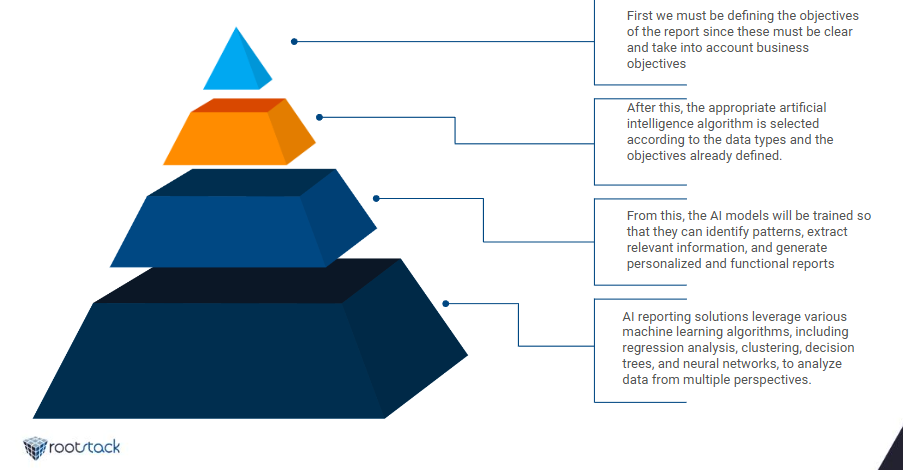
Artificial intelligence is a versatile tool, it can be adapted to almost any need that the user or, in the case of this article, the company, has, allowing processes to be carried out in an accelerated manner and without errors, especially those that may result a little tedious like custom reports.
In today's business landscape, reporting is a critical activity for strategic decision-making. However, traditional reporting methods are often static, generic, and not tailored to the specific needs of each user. This can lead to information overload, a lack of understanding of key data, and ineffective decision-making.
Artificial intelligence offers a transformative opportunity for reporting, enabling the creation of personalized, dynamic, data-driven reports that fit the needs of each user. Customized AI-powered reports can provide relevant and actionable insights, improve operational efficiency, and support better decision-making.

Key components of personalized reporting with AI
AI-enabled custom reporting systems rely on several key components:
- Data Access: Collecting and storing accurate and relevant data from various sources is essential to power AI models.
- Data Preparation: Data must be cleaned, preprocessed, and transformed so that AI models can interpret and analyze it correctly.
- AI Models: Different AI algorithms, such as machine learning and natural language processing (NLP), are used to extract information from data, identify patterns, and generate personalized reports.
- Data visualization: Custom reports should be presented in a clear, concise, and attractive manner using effective data visualization techniques.
- User Interface: The user interface should be intuitive and easy to use, allowing users to access, interact, and navigate custom reports efficiently.
Selecting the right technology
Selecting the right technology for custom AI reporting depends on several factors, such as specific business requirements, data volume and complexity, and available resources. These are some of the most popular artificial intelligence tools for generating personalized reports:
Offers a wide range of tools for data visualization and business analysis.
Provides AI capabilities for data preparation, predictive analysis, and custom reporting.
A cloud analytics platform that offers AI capabilities for custom reporting and business intelligence.
Allows the creation of interactive and personalized reports using AI and data visualization.

Development of AI models for the generation of personalized reports
The development of AI models for the generation of personalized reports involves several steps, the first of which must be defining the objectives of the report since these must be clear and take into account business objectives. This must be clear since from here we will start to select the data that said report should contain.
After this, the appropriate artificial intelligence algorithm is selected according to the data types and the objectives already defined. This algorithm will be selected by the development agency or your IT team, taking into account its usability and the functions it has.

From this, the AI models will be trained so that they can identify patterns, extract relevant information, and generate personalized and functional reports. This is where the true power of artificial intelligence comes into action, with its natural language processes and machine learning mechanisms, the chosen tool will be able to detect trends and irregular patterns, for example, to discard them.
AI reporting solutions leverage various machine learning algorithms, including regression analysis, clustering, decision trees, and neural networks, to analyze data from multiple perspectives.

AI Custom Reporting Challenges
Like any activity that involves the use of technology, creating a personalized report with AI faces several significant challenges. One of the main ones is the quality of the data used to train the AI models, as the accuracy and completeness of this data are essential for reliable results. Furthermore, algorithmic biases must be identified and mitigated to ensure that reporting is fair and objective, thus avoiding the perpetuation of unintentional bias or discrimination.
Another important challenge is the explainability of AI models. Complex algorithms are often difficult to understand and interpret, which can raise questions about the reliability and transparency of the reports generated. This is crucial, as users need to understand how and why certain conclusions were reached to trust them.
Finally, integrating AI-powered custom reporting systems into existing workflows and systems can be complicated. Adapting and synchronizing new technologies with pre-existing infrastructures requires time and resources, and can face resistance within organizations.
The future of personalized reporting with AI
Personalized reporting with AI is in an early stage of evolution, but its potential is significant. As AI technology continues to develop, we can expect to see more sophisticated, personalized, data-driven reporting that transforms the way businesses make decisions and operate.
At Rootstack we have a team of artificial intelligence experts, who can help you create the necessary algorithms to process personalized reports, adjusted to business needs.
We recommend you on video

